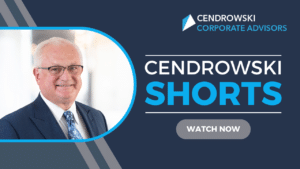To maximize tax efficiency, Cendrowski Corporate Advisors professionals develop creative tax planning strategies that utilize small business stock gain exclusions outlined in IRS Code 1202. In many cases, you may be able to realize significant tax savings.
If you’re considering investing in a mid-sized business, Cendrowski Corporate Advisors can help you make the most of this tax planning opportunity.
IRS Code 1202 and the Small Business Stock Gain Exclusion
IRS Code 1202 stipulates that taxpayers can exclude a substantial amount of eligible gain from the sale or exchange of small business stock for a Qualified Trade or Business (QTB), as long as that sale or exchange doesn’t exceed one of these criteria:
- The greater of $10 million, reduced by prior gains attributable to the same issuer
- Ten times the aggregate adjusted basis of the investment issued by the corporation and disposed of by the investor during the year
Selling an investment in separate transactions over multiple years provides tax planning opportunities that may help minimize or defer tax payments.
For investments to qualify for the small business stock gain exclusion as Qualified Small Business Stock (QSBS), they must be original issue and held for a specified minimum length of time.
A Qualified Trade or Business (QTB) Defined
The IRS considers a QTB as any trade or business not engaged in the following trade or businesses:
- Professional services like health, law, engineering architecture, accounting, actuarial science, performing arts, consulting, athletics, financial services, brokerage services, or a business where the principal asset is the reputation or skill of any of its employees
- Banking, insurance, financing leasing, investing, or similar business
- Farming
- Mining, extraction, or natural gas
- Operating a hotel, motel, restaurant, or similar business
Qualifying as QSBS and the Planning Process
Whether it's entity structuring planning, business transactional planning, succession planning, or estate planning, our qualified team considers the merits of qualifying as QSBS as part of the planning process.
If a business meets specific qualifications under Section 1202 for QSBS, noncorporate investors who hold on to the stock for at least five years can exclude 100% of their gain, subject to certain limitations, on the disposition of the stock or of the business. Planning opportunities also exist for investors who dispose of the QSBS before the minimum five-year holding period if such proceeds are reinvested into another qualifying business.
The Cendrowski Corporate Advisors team is well-versed in the intricacies of QSBS, the associated documentation, and the specific steps tailored for each client scenario to meet the requirements under Section 1202.
Do You Qualify for Small Business Stock Gain Exclusion?
Based on our experience and IRS requirements, the following factors are representative, though not all-inclusive, of an ideal candidate for Small Business Tax Gain Exclusion planning:
- An active business, not a holding company that operates in trades other than service businesses, like manufacturing, construction, wholesale, retail.
- The business can meet an initial $50 million gross asset test.
- There is a long-term investment strategy of more than five years, including potential reinvestment.
- The company’s investor base includes at least one non-corporate owner.
- Investors aren't looking to pull significant after-tax cash flow out of the company during the operational phase.
- The projected growth of the business is sufficient to cover corporate-level tax.
- Ideally, the organization is a C corporation, but Cendrowski Corporate Advisors can strategize with other business types.
- Management recognizes the importance of the continuation of meeting specific financial goals and requirements.

Client Success: Small Business Stock Gain Exclusion
Cendrowski Corporate Advisors was engaged to review the existing structure and tax planning for a business conglomerate. The portfolio of companies, as well as each individual company, had its own financial executives and multiple third-party advisors from each facet of the business: legal, accounting, financing, and others.
Although well supported with experienced advisors, we were able to identify planning opportunities that were not in place, one of which was the utilization of the QSBS provisions under Section 1202. We worked closely with the organization’s team of legal and financial advisors and key company personnel to become familiar with the business and its entity and ownership structures. We also reviewed the tax and financial positions and were able to identify specific entities to focus on at a deeper level that might benefit from QSBS status.
After performing after-tax cash flow projections delineating the tax savings and benefits of qualifying as a QSBS, we worked as a team to gather the pertinent information and documents to determine whether specific requirements were met. We made recommendations for addressing any requirements that needed to be met to satisfy Section 1202. We also carefully reviewed the impact on other tax and financial issues to make the best overall recommendations.
The client now has a recommended advisory committee. We have provided a detailed road map for 1202 qualification through the company lifespan to maintain the QSBS status and realize the up to $15 million projected tax savings to the controlling family and/or third-party investor interests.

